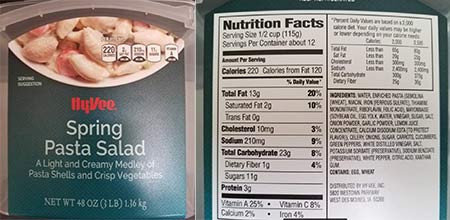Our law firm is investigating a Salmonella lawsuit for people sickened in the outbreak potentially linked to eating Hy-Vee Spring Pasta Salad. At least 20 people have been sickened in Iowa, Minnesota, Nebraska, and South Dakota.

“We are seeing a spike in the number of food poisoning cases in the Midwest,” said attorney Fred Pritzker, who leads the food poisoning legal team that is currently representing over 100 people in Minnesota and Iowa who were sickened by contaminated salads and vegetable trays sold by other retailers. “People should be able to shop at a grocery store and not have to worry about contaminated food. More needs to be done to protect consumers.”
Contact our Salmonella lawyers for a free consultation using the form below.
Salmonella food poisoning can result in colitis, a severe infection in the colon that can require surgery. Cells of the bacteria can travel from the colon to the bloodstream. The result can be aneurysms, endocarditis (heart infection), arthritis, Salmonella meningitis, and/or a life-threatening condition called sepsis, which can result in multiple-organ failure.
Hy-Vee Spring Pasta Salad Recall
Hy-Vee, Inc. has issued a recall of its Hy-Vee Spring Pasta Salad because it may be contaminated with Salmonella, bacteria that can cause severe illness and may be fatal. The voluntary recall includes Hy-Vee Spring Pasta Salads in both 1 pound (16 oz.) and 3 pounds (48 oz.) containers produced between June 1, 2018, and July 13, 2018, and available from the deli service case.
The pasta salad was distributed to all of Hy-Vee’s 244 grocery stores across its eight-state region of Iowa, Illinois, Missouri, Kansas, Nebraska, South Dakota, Minnesota, and Wisconsin. The product comes in a plastic container with a plastic lid. The expiration date range is between June 22, 2018, and Aug. 3, 2018. The expiration date can be found on the side of the container.
According to the FDA recall announcement, “out of an abundance of caution, Hy-Vee voluntarily removed the product last night from all of its shelves and service cases as soon as the grocery chain was notified about the situation.”